22 Sales Closing Phrases to Convert Prospects into Customers
Anya Vitko
Contents
- What Are Sales Closing Phrases?
- Why Are Closing Phrases So Important?
- Types of Sales Closing Phrases and When to Use Them
- 22 Sales Closing Phrases and Why They Work
- How to Use Sales Closing Phrases Effectively
- Common Mistakes to Avoid with Sales Closing Phrases
- Streamline Sales Closing Efforts with Yesware
- Final Tips to Master Sales Closing Phrases
- Conclusion
- Sales Closing Phrases FAQs
As a sales rep, you know very well that first and last impressions matter the most. While countless online resources offer strategies to help close contracts, few are as impactful as the power of well-crafted, tried-and-true sales closing phrases.
The science behind effective sales closing phrases relies on a wide range of various psychological principles, cognitive biases, and even neurolinguistic programming. Countless research supports that when leveraged by trained sales experts, these techniques work.
Are you interested in learning more about how to leverage human psychology to grow your company’s revenue? This article will not only empower you with the magic to influence potential customers toward making purchasing decisions, but it will also share tips on common mistakes to avoid and provide an overview of tools that can help you streamline your sales process.
Here’s what we’ll cover:
- What Are Sales Closing Phrases?
- Types of Sales Closing Phrases and When to Use Them
- 22 Sales Closing Phrases and Why They Work
- How to Use Sales Closing Phrases Effectively
- Common Mistakes to Avoid with Sales Closing Phrases
- Streamline Sales Closing Efforts with Yesware
- Final Tips to Master Sales Closing Phrases
- FAQs
What Are Sales Closing Phrases?
If you’re wondering how to close a sale, you’re in the right place. This is where sales closing phrases come into play.
A sales closing phrase is a well-crafted statement or question that pushes the prospect through the sales funnel toward making a decision, whether that’s agreeing to a sales demo, setting up another meeting, or signing a contract.
The science behind sales closing phrases is a subdomain of sales psychology:
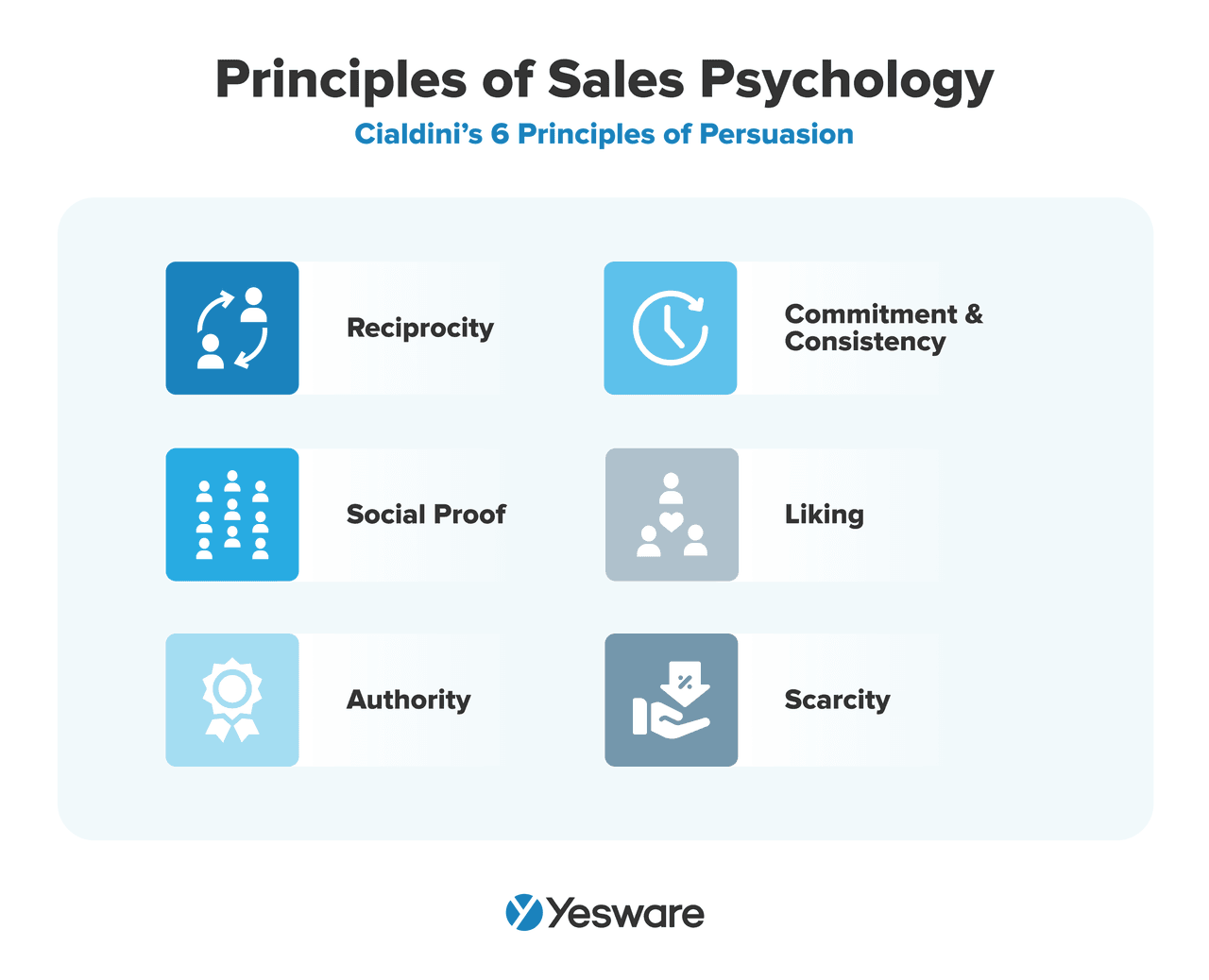 At their core, closing phrases tap into the psychology of decision-making:
At their core, closing phrases tap into the psychology of decision-making:
Cognitive Biases
- Framing effect: how options are presented influences decisions.
- Anchoring: initial information serves as a reference point for decisions.
- Loss aversion: people are more motivated to avoid losses than to acquire gains.
Establishing an Interpersonal Relationship
- Reciprocity: when salespeople offer value or concessions, prospects feel obligated to reciprocate.
- Scarcity: when sales reps use phrases that create urgency or imply limited availability.
- Social proof: sales reps use statements that reference other satisfied customers to provide social validation.
Neurolinguistic Programming (NLP)
- Presupposition: in this scenario, sales reps use phrases that assume the sale.
- Future pacing: sales reps encourage prospects to visualize future benefits to activate decision-making areas of the brain.
Emotional Appeal
- Fear of Missing Out (FOMO): sales reps create a sense of urgency to tap into the prospect’s fear of missing an opportunity.
- Aspiration: sales reps use phrases that connect the product or service to the prospect’s goals and dreams are powerful motivators.
Risk Reduction
- Reassurance: phrases like “Our team will be there to support you every step of the way” help alleviate concerns and build confidence.
- Trial framing: presenting the decision as a trial rather than a commitment can lower perceived risk.
While some of these psychological tricks may be familiar to you, such as using the law of reciprocity, others might be less well-known.
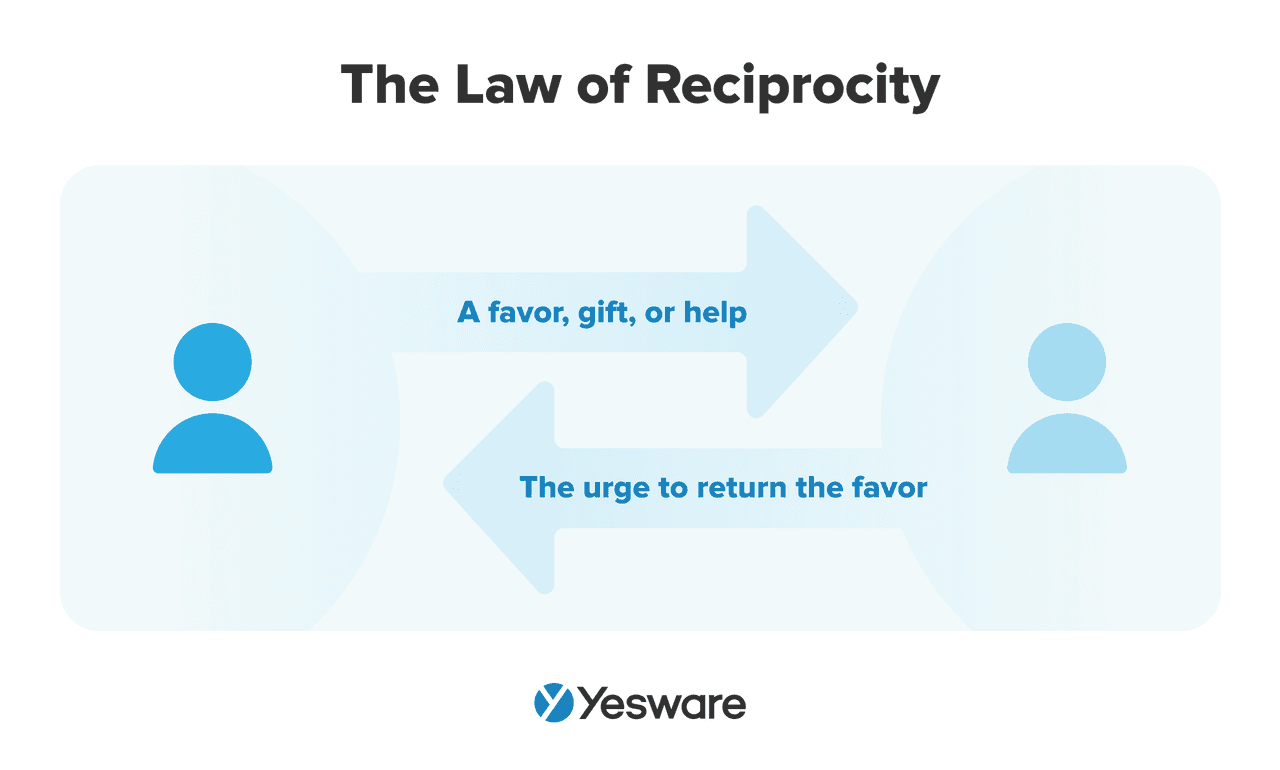
Let’s take a closer look at what neurolinguistic programming (NLP) is.
Neurolinguistic Programming (NLP)
This is an approach to communication, personal development, and psychotherapy that examines the connections between neurological processes (neuro-), language (linguistic), and learned behavioral patterns (programming).
NLP was developed in the 1970s by Richard Bandler and John Grinder, who studied how effective communicators and therapists influenced others and sought to replicate these patterns for personal and professional growth.
NLP is based on the idea that people can reprogram their mental and emotional patterns by changing their language and thought processes.
Here are two NLP techniques applicable to closing sales calls:
1. Presupposition
A presupposition is an implied assumption embedded within a statement or question that is taken as truth by the listener, often subconsciously. In NLP, presuppositions are used to shape the listener’s perception by subtly embedding certain beliefs or ideas into communication, guiding them to accept these ideas without questioning them explicitly.
2. Future Pacing
Future pacing is a technique used to help someone mentally project themselves into a desired future scenario where a positive change or goal has already been achieved. This visualization makes the benefits of a purchase feel more tangible.
Why Are Closing Phrases So Important?
Closing phrases are essential because they do more than just signal the end of a conversation; they close gaps in understanding and build trust. Here’s why timing and personalization are key:
- The effectiveness of a closing phrase relies on when it’s introduced. Using it too early can come across as pushy, while waiting too long might mean missing the right moment to address hesitations. When timed well, a closing phrase feels natural, guiding the prospect into a decision-making mindset.
- The impact of a closing phrase increases when it speaks to the prospect’s unique pain points, challenges, and goals. Personalizing your closing phrases shows attentiveness and demonstrates that you understand what matters most to them, making the decision to move forward feel mutually beneficial.
Types of Sales Closing Phrases and When to Use Them
While the previous section has categorized sales closing phrases based on the psychological principles they rely on, there is another way to categorize them depending on how prospects respond to the sales pitch:
1. Direct Closing Phrases
These are simple, straightforward requests for commitment, best suited to prospects who have shown a clear interest in your product or service.
You can use direct closing phrases when the prospect has consistently shown signs of interest and your discussions suggest they’re ready to move forward. This approach is especially effective with decisive buyers who value directness.
2. Assumptive Closing Phrases
These phrases imply that the prospect is ready to move forward. They’re useful in building momentum by subtly guiding the prospect to envision themselves already benefiting from the solution.
This type of closing is most effective when the prospect has positively responded to your solution’s benefits and hasn’t raised any major sales objections.
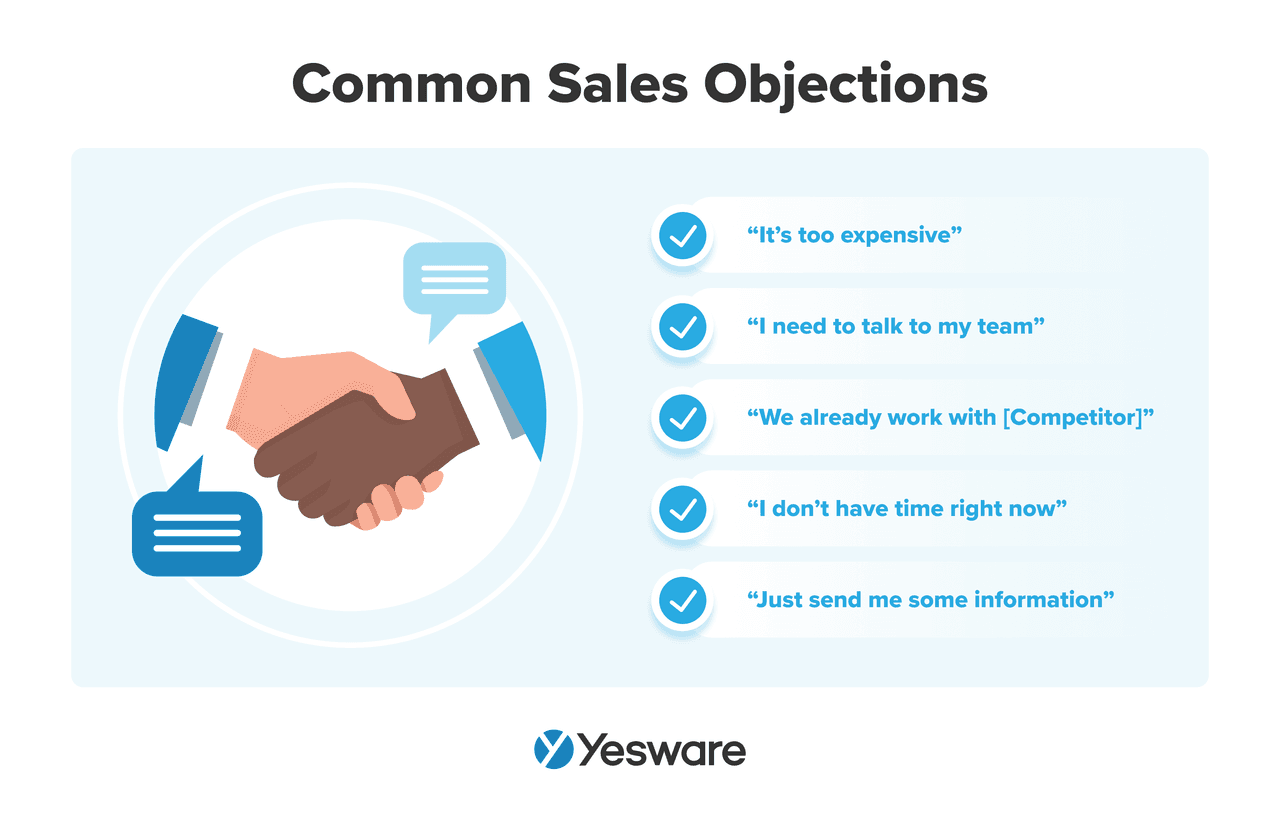
Assumptive closing is effective for prospects who may need a slight nudge to take the next step of the sales process.
3. Urgency-Based Closing Phrases
Urgency-based closing phrases create a sense of immediacy, encouraging the prospect to act quickly to secure a limited-time offer or lock in a current price. This approach taps into the “fear of missing out” (FOMO) and is particularly effective in fast-paced, competitive markets.
Urgency-based phrases work best when there’s a genuine advantage to acting quickly. These phrases are ideal for overcoming procrastination in interested but hesitant prospects, helping them see the benefits of deciding sooner rather than later.
4. Value-Driven Closing Phrases
Value-driven closing phrases emphasize the long-term benefits of your solution, reinforcing its positive impact on the prospect’s business. These phrases help build rapport, showing the prospect you care about their success beyond just making a sale.
These phrases bring the conversation back to the value and benefits of your offering rather than simply focusing on the transaction. By encouraging the prospect to envision success with your solution, you can facilitate a more thoughtful commitment and take the first step toward relationship building.
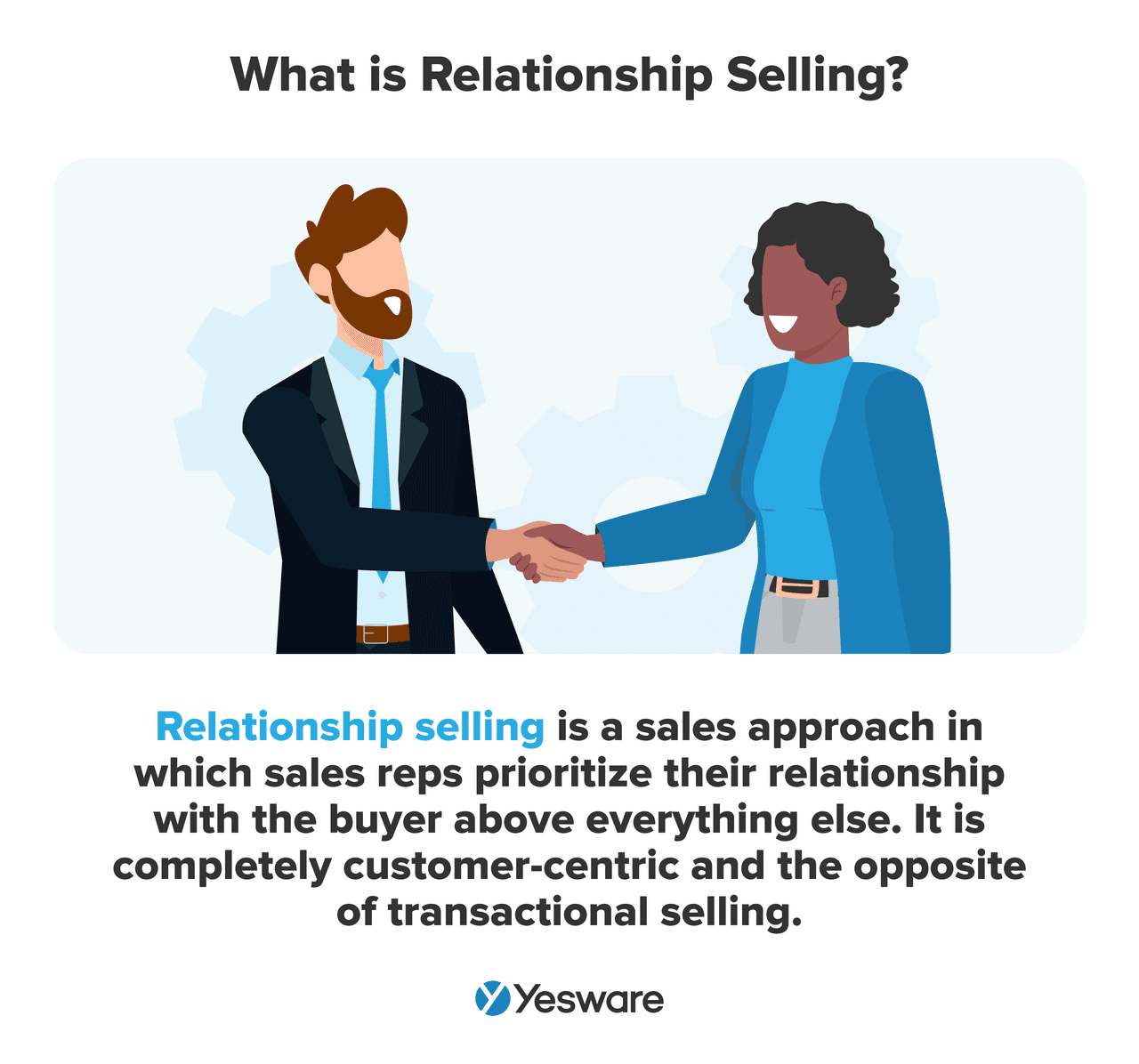
22 Sales Closing Phrases and Why They Work
Let’s take a look at 22 powerful closing phrases that exemplify how you can use each of the sales tactics listed in the previous section.
Framing Effect
“By choosing [product/solution], you’re investing in a streamlined process that saves you time and reduces costs. Sticking with your current approach may mean continued challenges and potential inefficiencies. Which direction feels more aligned with your goals?”
In this example, the choice is “framed” in a way that highlights the benefits of adopting the solution versus the potential downsides of staying with the status quo. This encourages the prospect to see the new solution as a positive shift while viewing the alternative as less desirable.
To effectively leverage the framing effect, you should master the nuts and bolts of consultative sales:

Anchoring
“Our standard plan typically costs [$X] per year, but since you’re one of our early adopters, we’re offering it to you at a special rate of [$Y] for the first year. Shall we go ahead and lock in that rate?”
Here, the initial price serves as the anchor, making the discounted rate appear more attractive by comparison. By setting an anchor with a higher value, you increase the perceived value of the offer, making the prospect more likely to view the discounted price as a good deal.
Loss Aversion
“This promotion is only available until the end of the week, and I’d hate for you to miss out on these savings and the added value. Shall we go ahead and secure it for you today?”
This phrase encourages your prospect to act quickly by emphasizing the potential loss of the sales promotion if they delay. By highlighting what they might miss out on, it taps into their desire to avoid that potential loss, making them more inclined to commit sooner.
Reciprocity
“We’ve customized this solution to align with your unique needs and even included a complimentary three-month support package to ensure a smooth transition. Would you be ready to get started so you can take full advantage of these added benefits?”
By offering additional support or customization at no extra cost, this approach leverages the law of reciprocity, encouraging the prospect to respond positively and proceed with the purchase.
Scarcity
“We only have a few spots left at the introductory rate, so if you’re ready to move forward, we can lock in this pricing for you today. Does that work?”
By emphasizing limited availability, this approach encourages the prospect to secure the opportunity before it becomes unavailable.
Urgency-Based Closing
“We’re currently running a special promotion that ends tomorrow. If you sign up today, you’ll get a [X%] discount on your first year’s subscription, plus we’ll throw in our premium onboarding package at no extra cost. This package usually costs [$Y], but it would be complimentary for you.”
The time-limited nature of the offer creates a sense of urgency, encouraging the prospect to make a decision quickly.
Social Proof
“Our solution is trusted by over [X] companies in your industry, including [Company A], [Company B], and [Company C]. In fact, [Y%] of our clients report a [Z%] increase in [benefit] within the first [period of time] of implementation.”
This closing phrase builds trust by showing that many other businesses, including industry leaders, have already chosen the solution.
Presupposition
“When would you like us to schedule the installation of your new [product/solution]?”
This type of sales closing phrase is effective because it can prompt the prospect to mentally shift from deciding whether to buy to planning the implementation.
Future Pacing
“Imagine [time period] from now: you’ve implemented our [product/service], and your [pain point] has been effectively addressed. You’re able to take on more clients, your revenue has grown, and you’re no longer stressed about meeting deadlines. Are you ready to take the first step towards making that vision a reality?”
This closing phrase shifts the prospect’s mindset from considering a purchase to imagining already having benefited from it.
Fear of Missing Out
“This exclusive offer is only available to the first [X] customers who sign up today. We’ve already had [Y] people take advantage of it, so there are just [X-Y] spots left. Would you like to secure one of the remaining slots before they’re all gone?”
This closing phrase emphasizes exclusivity by mentioning that the offer is only available to a limited number of customers. In the case that only a few spots are left, the sales closing phrase implies that the offer is in high demand.
Aspiration
“By investing in our solution today, you’re not just solving a current problem, you’re positioning your company as an industry leader for years to come. Can you envision how this strategic move will set you apart from your competitors and drive your business to new heights?”
This closing phrase appeals to the prospect’s ambitions by mentioning “new heights” for their business.
Reassurance
“I completely understand your concerns about implementing a new system. Rest assured, our team of experts will be there to support you every step of the way, from initial setup to ongoing maintenance. We’ve successfully onboarded over [X] companies just like yours, and [Y%] of our clients report a smooth transition. You’re in good hands with us.”
Promising ongoing support addresses potential worries about being left alone after the purchase. Also, mentioning a team of experts implies your company’s competence and reliability.
Trial Framing
“Why don’t we start with a [X-day] trial period? This will give you and your team a chance to experience firsthand how our solution can streamline your operations and boost productivity. There’s no long-term commitment, and if you’re not completely satisfied, you can walk away. Shall we set up your trial account today?”
This sales closing technique explicitly states there’s no long-term commitment, lowering the barrier to entry for prospects.
Direct Closing
“Based on everything we’ve discussed, it’s clear our solution addresses your key challenges. Are you ready to move forward with the purchase today?”
This type of closing phrase is effective because it assumes a positive outcome, which can be psychologically influential and prompts an immediate response, speeding up the sales cycle.
Value-Driven Closing
“Based on our discussion, it’s clear that our solution will increase your team’s productivity by [X%] and save you [$Y] annually in operational costs. When you consider the long-term value and ROI, this investment pays for itself within the first [time period]. Are you ready to move forward and start realizing these benefits for your business?”
Translating features into tangible outcomes like increased productivity and cost savings frames the purchase as an investment rather than an expense.
Assumptive Closing
“Great, so based on everything we’ve discussed, which delivery date works better for you—next Tuesday or the following Friday?”
Offering a choice between two options assumes the sale is moving forward.
Additional Sales Closing Phrases
Here are some more sales closing phrases for you to practice:
- “If we could meet [specific need], would you be ready to move forward?” (direct closing puts the prospect in the mindset of a completed deal.)
- “Let’s get started today so you can [achieve specific benefit] right away.” (urgency-based closing creates urgency by emphasizing immediate benefits.)
- “When would you like to schedule our onboarding session?” (assumptive closing positions the deal as already decided and helps the prospect feel comfortable with moving forward by focusing on the next steps.)
- “Our solution addresses all three of your main pain points: [X], [Y], and [Z]. Given these significant improvements, how do you see this fitting into your current operations?” (value-based closing demonstrates how a solution delivers real, measurable value to your prospect’s business.)
- “Would you be open to starting with a short-term commitment and expanding later?” (trial-framing alleviates the pressure of having to make a final decision)
- “Would you like to take advantage of [special offer/discount] before it expires?” (leveraging FOMO (fear of missing out) motivates prospects to act to avoid losing out on potential savings.)
How to Use Sales Closing Phrases Effectively
Step 1: Practice Using Sales Closing Phrases During Mock Calls
Practicing sales closing phrases in mock calls can make it easier for you to use them in conversations with prospects. By mastering a range of phrases, you can reduce hesitation during real calls.
In your initial rounds of mock calls, focus on mastering simpler closing phrases. Practice using these phrases with different tones and emphases to sound confident and genuine. As you grow more comfortable, incorporate more complex closing tactics, such as those that add urgency or offer multiple options.
Practicing with a partner, like a fellow sales rep or sales mentor, allows you to simulate a realistic conversation. Choose someone who can give honest feedback on your delivery and help you refine each phrase. You might also try role-playing different buyer personas to challenge yourself to adapt the phrasing based on customer response.
Feedback is one of the most valuable elements of mock calls. After each session, ask for specific feedback on your sales closing phrases. Here are sample questions:
- Did my closing phrase sound natural?
- How could I have adjusted my sales close based on the customer’s objections?
- Did the phrase make it clear that I was asking for a commitment, or was it too subtle?
- Did the closing phrase convey value, or did it feel like I was just trying to ‘close the deal’?
- Did I come across as genuinely interested in solving your problem?
- Was my approach flexible enough, or did it seem like I was sticking rigidly to a script?
Step 2: Determine Your Customer’s Personality Type
Next, choose a sales closing phrase that will be the most successful with your prospect. Customers can be categorized into different personality types. Each personality favors different types of sales closing phrases.
Here’s an overview of the main personality types:
- The Analytical Customer: Detail-oriented and logic-driven individuals who value facts, figures, and thorough information.
- The Amiable Customer: Friendly, cooperative, and relationship-oriented, valuing harmony and personal connections.
- The Assertive Customer: Goal-oriented, decisive, and often in a hurry, valuing efficiency and quick results and making decisions on the fly.
- The Expressive Customer: Outgoing, enthusiastic, and people-oriented, holding creativity and personal interactions in high esteem.
The table below summarizes what types of sales closing phrases fit which customer personalities:
| Analytical | Amiable | Assertive | Expressive |
| Value-Driven Close
Loss Aversion Close Trial Framing Close | Social Proof Close
Reciprocity Close Reassurance Close | Assumptive Close
Direct Close Scarcity Close Urgency-based Close Presupposition Close | Aspiration Close
Future Pacing Close FOMO Close |
It’s important to keep in mind that some types of closing phrases fit all types of customers. What matters is framing.
Here’s how you can tweak the framing effect to cater to each customer personality type:
- Analytical Customers: Frame the decision in terms of data and logical outcomes. For example, you could say, “Our analysis shows that implementing this solution will increase your productivity by 30% and save $50,000 annually. Given these metrics, are you ready to move forward with the deal?”
- Driver (Assertive) Customers: Frame the decision in terms of competitive advantage and quick results. You could say, “By moving forward today, you’ll be among the first in your industry to leverage this cutting-edge solution, giving you a significant edge over your competitors.”
- Amiable Customers: Frame the decision in terms of relationship-building and long-term support. Here is an example: “By choosing us, you’re investing in a long-term partnership. Our team will be there to support you every step of the way, ensuring your success well into the future.”
- Expressive Customers: Frame the decision in terms of future potential and transformative outcomes. For example, you could say, “Picture yourself achieving the success you’ve always dreamed of with our solution. How do you envision this level of growth transforming your business in the coming years?”
Anchoring is another selling technique that works for any customer type if used correctly:
- Analytical Customers: Use precise data and logical comparisons in your anchoring phrase, such as in this example: “Our top-tier solution costs $10,000, which is significantly less than the industry average of $15,000. However, for your specific needs, we can offer a customized package at $8,500. This represents a 15% savings over our standard price and a 43% savings compared to the industry average. Given these figures, how does this align with your budget expectations?”
- Driver (Assertive) Customers: For assertive customers, use direct anchoring that emphasizes control and quick results. Here’s an example: “Our executive solution is priced at $15,000, delivering an average ROI of 300% within the first year. For you, I can offer our accelerated package at $11,000, which still targets a 250% ROI but with a faster implementation time. This puts you in control of rapid results. Are you ready to move forward with this high-impact option?”
- Amiable Customers: Use soft anchoring that emphasizes relationships and security: “Many of our long-term clients initially started with our premium package, which is valued at $10,000. However, given our goal of building a lasting partnership with you, we’re offering a special introductory rate of $7,500. This allows you to experience our full range of services while we get to know your unique needs better. How does this sound as a starting point for our relationship?”
- Expressive Customers: Use anchoring that appeals to emotions and status: “Our VIP package, used by industry leaders and innovators, is typically priced at $12,000. However, I’m excited to offer you our new ‘Rising Star’ package at just $8,000. This gives you access to 80% of our VIP features, perfect for ambitious companies like yours that are ready to make a big impact. Can you see how this could transform your business?”
Looking to better understand sales psychology and buyer behaviors? Grab our ebook below.
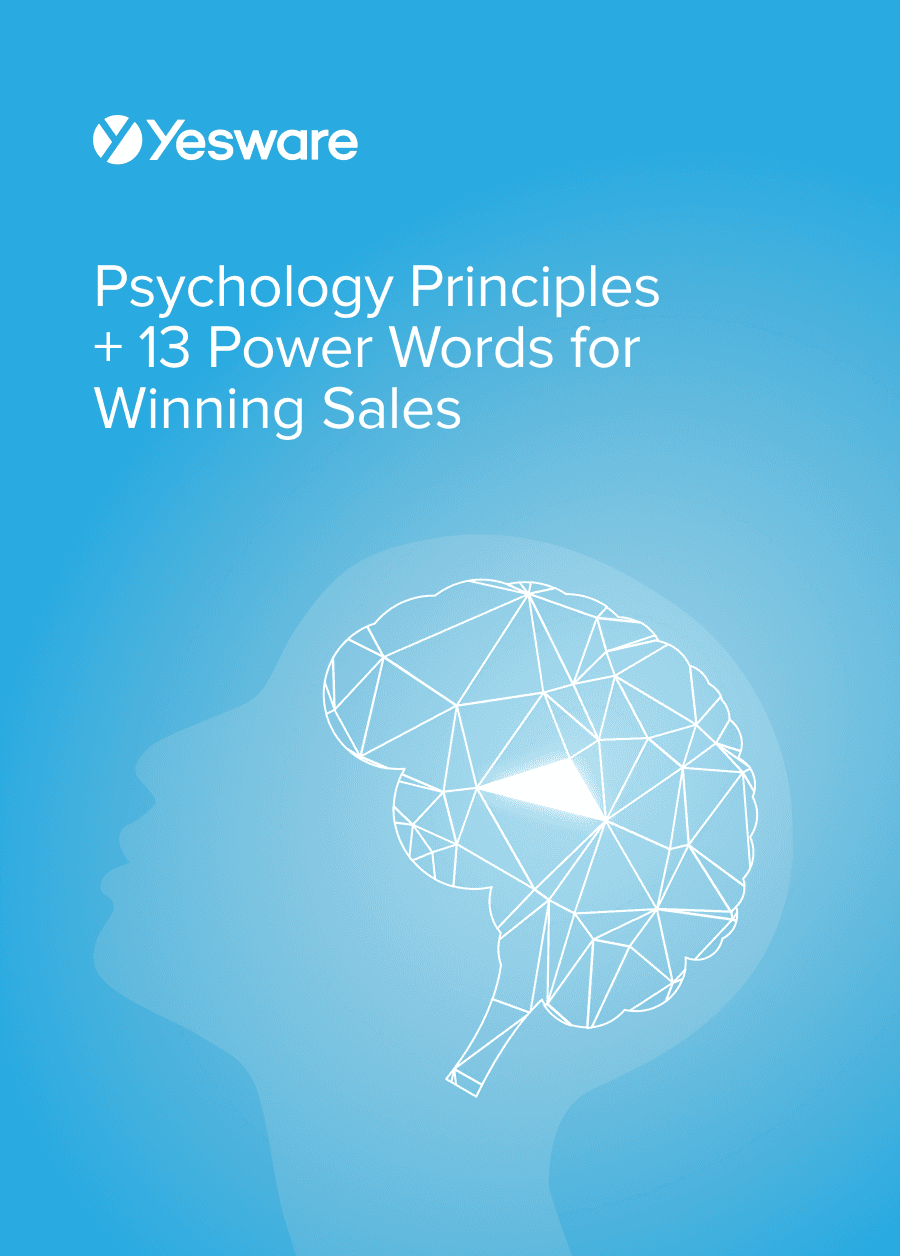 Psychology Principles + 13 Power Words for Winning SalesData-backed psychological principles, nonverbal cues, and persuasive phrases to win more deals.
Psychology Principles + 13 Power Words for Winning SalesData-backed psychological principles, nonverbal cues, and persuasive phrases to win more deals.
Common Mistakes to Avoid with Sales Closing Phrases
If you’re new to selling, there are a number of common mistakes to keep in mind.
1. Overusing Closing Phrases
Using closing phrases excessively throughout the conversation can make a sales rep seem pushy or, worse, desperate. Customers can sense when a sales rep is overly focused on closing rather than building a relationship, which can damage trust and make the buyer feel pressured or uncomfortable.
2. Ignoring Buyer Signals
Sales reps who ignore buyer signals—such as body language, tone, or verbal cues—risk missing opportunities to close effectively. For example, if a buyer sounds hesitant or uncertain but the sales rep moves forward with a hard close, it can feel dismissive and push the buyer further away.
3. Lack of Follow-Through
Closing a sale successfully doesn’t end with a handshake or contract signature. Failing to follow through on commitments made during the sales process can reflect poorly on your reliability and your company’s reputation.
Streamline Sales Closing Efforts with Yesware
Mastering sales closes doesn’t have to be hard. Here is an overview of various tools that can help you streamline your sales process.
1. Template Storage for Closing Phrases
Closing phrases vary in tone and approach: what works for one prospect might fall flat for another. Yesware’s email templates help sales reps store and organize their best closing phrases in one central place.
You can save these phrases as templates, categorizing them by buyer persona, urgency level, or decision stage. This way, you have all the necessary sales closing phrases at your fingertips.

For instance, if you’re on a call with a prospect who’s close to deciding but has a few concerns, you can quickly access a template for a value-driven closing phrase, like “Can you see this solution fitting into your current process?”
Meanwhile, if you’re working with a prospect who’s shown high engagement, you can quickly access a direct closing phrase like “Can we move forward with the contract?”
Having these options stored and readily available reduces the time spent searching and allows for smoother, more natural transitions to closing.
2. Email Tracking for Engagement
One of the best indicators that a prospect is ready to close is their engagement with your emails. Yesware’s email tracking feature is a powerful tool that shows you exactly when a prospect opens an email, clicks on links, or views attachments.
![]()
With these insights, you can gauge your prospect’s interest level and determine the most strategic moments to follow up with a closing conversation.
For example, if a prospect opens an email multiple times, clicks on the pricing link, and downloads the product brochure, it’s a strong signal that they’re seriously considering the offer. Armed with this information, you can time your sales outreach to when the prospect is actively engaged and more likely to respond positively.
3. Engagement Analytics for Data-Driven Improvement
Yesware’s reporting and analytics feature empowers you with the data you need to gauge the customer personality types of your prospects to choose the most appropriate closing technique.
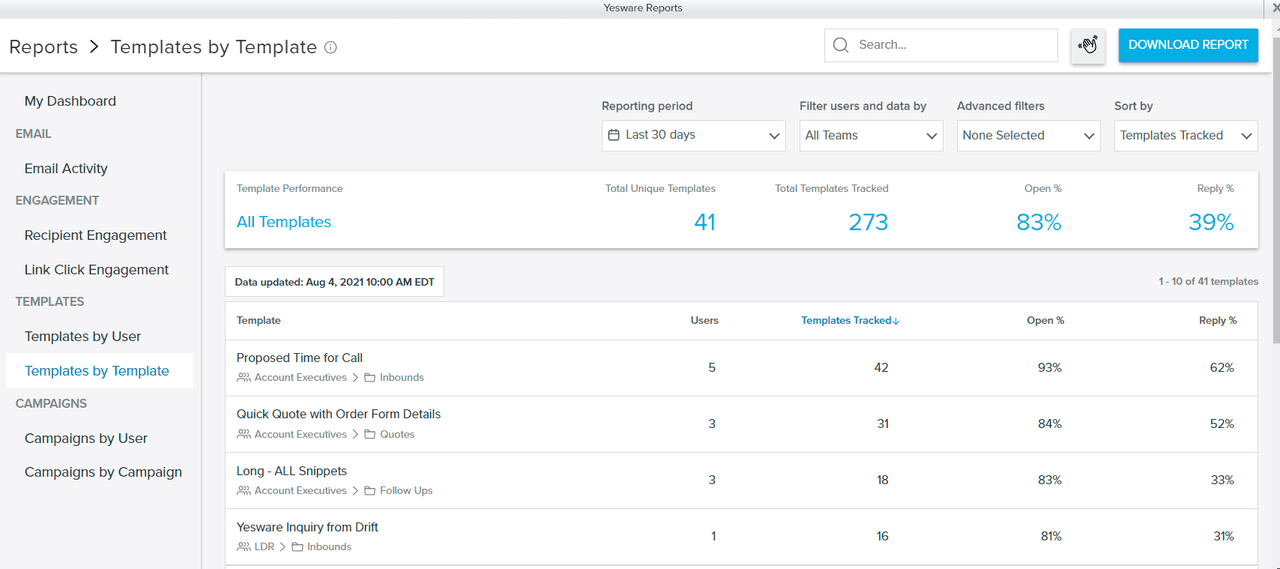
For example, if your lead downloads data-heavy resources, such as ebooks and white papers, it may indicate that they fit into an analytical customer type, and so using a direct close, for example, may be your best bet at the end of a sales call.
Another example is if your prospect shows high engagement with testimonials and social proof videos in your emails. In this case, you may practice a social proof close to get the prospect to convert.
Final Tips to Master Sales Closing Phrases
Here are some final tips to help you master your closing phrases, from experimenting with new approaches to leveraging technology to refine and personalize your techniques.
1. Experiment and Learn
Every prospect is unique, and what resonates with one may not work with another. For this reason, you should keep experimenting with different closing phrases and learn from each experience.
Whether using a soft close like “How does this solution fit into your goals?” or a direct approach like “Shall we move forward with the contract?” each type of phrase has its own impact depending on the buyer’s personality, decision stage, and engagement level.
Remember to keep notes about what works and what doesn’t, such as which phrases seemed effective and which didn’t hit the mark.
2. Build Confidence in Delivery
Even the most perfectly crafted sales closing phrase can fall flat if delivered without confidence. How a phrase is delivered—tone, pace, and conviction—can make a significant difference in how it’s received by the prospect. You should practice your closing phrases until they sound natural and authentic, as this can help you avoid sounding scripted or overly rehearsed.
3. Leverage Technology for a Winning Edge
Sales tools like Yesware can be invaluable in helping you personalize sales closes. Yesware allows you to save frequently used closing phrases as templates, making it easy to access the right phrase at the right time.
Yesware also offers email tracking and engagement analytics, showing you when prospects are engaged with your emails, links, and attachments, helping you pinpoint the best times to reach out with a closing statement personalized to cater to each prospect’s customer personality type.
Conclusion
Mastering sales closing phrases takes time, practice, and a willingness to adapt. By experimenting with different phrases, building confidence in delivery, and leveraging tools like Yesware to streamline and optimize closing efforts, you can improve your ability to close deals effectively. Try Yesware for free today!
Sales Closing Phrases FAQs
1. What are sales closing phrases and why are they important?
Sales closing phrases are statements or questions designed to guide prospects toward making a buying decision. They create urgency, highlight value, and overcome hesitation, helping sales reps close deals faster and more effectively.
2. How do I choose the right sales closing phrase?
Choose a closing phrase that matches the prospect’s personality, decision stage, and engagement level. For example, use value-driven phrases for analytical buyers and urgency-based phrases for assertive decision-makers.
3. Can sales closing phrases work for any industry?
Yes. Whether in SaaS, retail, or services, closing phrases tap into universal decision-making principles like scarcity, reciprocity, and social proof, making them effective across industries when tailored to the audience.
4. How can Yesware help me master sales closing phrases?
Yesware allows you to store closing phrase templates, track email engagement, and analyze prospect behavior. This ensures you deliver the right phrase at the right time for maximum impact.
5. What are examples of effective sales closing phrases?
Examples include “Shall we move forward with the contract?” (direct close) and “Would you like to take advantage of this offer before it expires?” (FOMO close). Each works best in specific selling situations.
6. When should I use a direct closing phrase?
Use direct closes when the prospect has shown clear interest, engaged with your proposals, and is ready for a decision. This approach is ideal for confident buyers who value efficiency.
7. What is an assumptive sales closing phrase?
An assumptive close implies the sale is already happening, such as “Which delivery date works best for you?” It works well when the prospect has responded positively and shows minimal objections.
8. How does social proof work in closing phrases?
Social proof leverages customer success stories, testimonials, or industry examples to build trust. For instance, “Companies like yours have increased revenue by 25% using this solution” reassures hesitant buyers.
9. Can Yesware track which closing phrases are most effective?
Yes. Yesware’s analytics show engagement trends, helping you identify which phrases generate responses and conversions so you can refine your approach.
10. How do urgency-based sales closing phrases work?
Urgency-based closes create a time-sensitive reason to act, such as “This offer expires tomorrow.” They tap into the fear of missing out (FOMO) and help hesitant buyers make timely decisions.
11. Are trial offers a good sales closing technique?
Yes. Trial-framing reduces perceived risk by allowing prospects to test your product before committing. This approach works especially well for new or cautious buyers.
12. How do I make sales closing phrases sound natural?
Practice until delivery feels conversational. Avoid reading directly from a script—adapt your tone, pacing, and phrasing to the prospect’s personality and needs.
13. Should I personalize every sales closing phrase?
Absolutely. Tailoring a phrase to a prospect’s challenges, goals, or past interactions makes it more persuasive and shows you understand their specific needs.
14. Can sales closing phrases help with indecisive buyers?
Yes. Phrases that emphasize value, minimize risk, or provide limited-time offers can help indecisive buyers commit by addressing their hesitation directly.
15. How can Yesware templates improve my closing rate?
By storing pre-tested closing phrases in Yesware, you can quickly access and deploy the most effective ones for each situation, reducing hesitation and improving consistency.
16. What’s the difference between value-driven and urgency-based closes?
Value-driven closes focus on long-term benefits and ROI, while urgency-based closes encourage immediate action to secure an offer. Both are powerful when used strategically.
17. How do I use NLP in sales closing phrases?
NLP techniques like presupposition (“When would you like to start?”) and future pacing (“Imagine your workflow three months from now…”) help prospects mentally commit before they decide.
18. Are sales closing phrases pushy?
Not when used correctly. Effective closes feel like a natural next step in the conversation, not pressure tactics, especially when they’re timed with buyer readiness.
19. How do I know if a sales closing phrase worked?
Look for verbal commitment, body language cues, or follow-up actions. With Yesware, you can track post-call engagement to confirm interest.
20. What mistakes should I avoid with sales closing phrases?
Avoid overusing them, ignoring buyer signals, or using mismatched styles. The wrong phrase at the wrong time can make you seem pushy and harm trust.
Get sales tips and strategies delivered straight to your inbox.
Yesware will help you generate more sales right from your inbox. Try our Outlook add-on or Gmail Chrome extension for free, forever!
Related Articles
Casey O'Connor
Anya Vitko
Anya Vitko
Sales, deal management, and communication tips for your inbox

